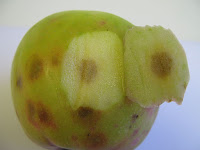Bitter pit can affect many apple varieties. The Granny Smith, Jonathan, Honeycrisp, Northern Spy, Gravenstein, Cortland, Fuji, Crispin, Empire, Ida Redd, and Baldwin are a few of the susceptible varieties. Rome Beauty, Winesap, Mackintosh, and Gala are all less susceptible varieties.
There are several things that can cause Bitter Pit, and a few different ways you can avoid or treat them.
Note: Bitter Pit can resemble damage caused by Stink Bugs. To learn more about Bitter Pit click here.
- Avoid wide fluctuations in soil moisture. Trees that have received too much or too little water are more prone to Bitter Pit. Mulch around the tree with a low nitrogen material to help retain moisture.
- Do not over fertilize. Excessive nitrogen or potassium seem to coincide with Bitter Pit.
- Do not over prune in the spring. Over pruning causes vigorous shoot growth. These shoots compete for calcium and it may result in Bitter Pit.
- Do not over thin in the spring. Large apples from small crops seem to be more prone to Bitter Pit.
- Late harvested fruit is prone to Bitter Pit. It can also develop if the fruit has been stored for a long time. Consider using the fruit quickly if bitter pit has been a problem in the past.
- Calcium sprays should be applied carefully and according to packaging directions if none of the above methods works.
Note: Bitter Pit can resemble damage caused by Stink Bugs. To learn more about Bitter Pit click here.

